Robot Turtles reminds me of (and is inspired by) Logo, the drawing programing language which was used to introduce children to the basics of programming during the 1980's. (What do they use these days?) Logo allowed you to move a cursor, called a turtle, using simple commands which could be combined to produce complex line drawings. It also reminds me of a version of the challenging board game RoboRally. RoboRally can be complex enough (and, when a bunch of commands are locked down, frustrating enough) that sometimes it's hard to convince adults to play, and I can imagine the difficulties in trying to explain the rules to a three or four year old. Robot Turtles solves this problem, looks like a really fun game, and will teach the fundamentals of programming.
Related Articles
Dan Shapiro designed Robot Turtles to play with his twin four year olds, but soon realized that he might have a great game that others would be interested in. He took a leave of absense from Google this summer to continue to develop the game, interview and discuss the project with some great game developers, investigate whether or not it would be feasible to print the game commercially in the United States, and launch the Kickstarter. It's quite possible that once this Kickstarter campaign is over, the games printed and shipped, and Dan returns to his job at Google, this game will never again be published (although I hope that it will continue to exist through continued self-publication, licensing to a game company, open sourcing, or some other method that will allow the game to still be available).
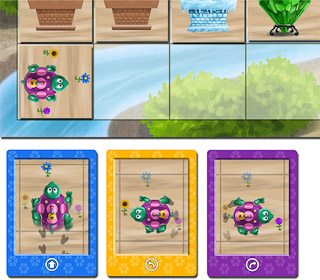 Robot Turtles grows with the players. During a child's first game, the adult player (who acts a game master / computer) tells the child the three basic rules:
Robot Turtles grows with the players. During a child's first game, the adult player (who acts a game master / computer) tells the child the three basic rules:1. Instruction cards are placed down one at a time.
2. Every time a card is placed, the adult will move the turtle according to the card (right will turn right, forward will move forward, etc.)
3. Move the turtle to a jewel to win!
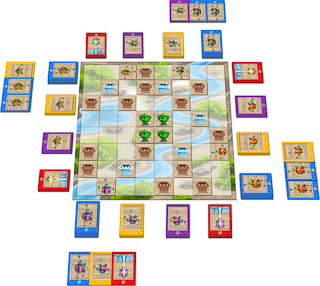 Since the adult moves the pieces and facilitates the game, the children are free to try things and see what happens. Once they've mastered the basic moves, additional pieces can be added to the game like ice walls to form a maze for them to navigate, laser cards for them to melt walls, and stone walls which are laser proof. Once these skills have been learned, you can have the players play more than one card at a time - effectively writing a program that controls the turtle's movement across the board. Dan's even added the concept of functions by providing a function frog card which allows the player to run through a set of cards defined as the frog's function. (In this advanced version of the game, the winner is the player who can get to the goal with the fewer total cards used.)
Since the adult moves the pieces and facilitates the game, the children are free to try things and see what happens. Once they've mastered the basic moves, additional pieces can be added to the game like ice walls to form a maze for them to navigate, laser cards for them to melt walls, and stone walls which are laser proof. Once these skills have been learned, you can have the players play more than one card at a time - effectively writing a program that controls the turtle's movement across the board. Dan's even added the concept of functions by providing a function frog card which allows the player to run through a set of cards defined as the frog's function. (In this advanced version of the game, the winner is the player who can get to the goal with the fewer total cards used.)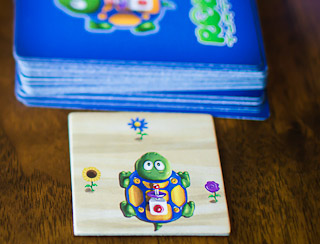 I'm incredibly excited about the learning opportunities provided by this game. Even if the child never learns to program, they'll learn the importance of order of operations, planning ahead, debugging (oh, forgot to mention that if a player makes a mistake, they can declare they have a "bug" and undo the previous move and try to fix it by providing a different card), and other important skills.
I'm incredibly excited about the learning opportunities provided by this game. Even if the child never learns to program, they'll learn the importance of order of operations, planning ahead, debugging (oh, forgot to mention that if a player makes a mistake, they can declare they have a "bug" and undo the previous move and try to fix it by providing a different card), and other important skills.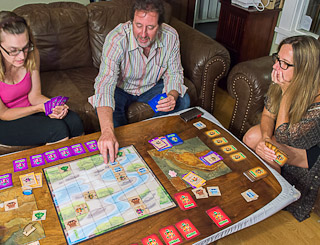 The Kickstarter campaign ends this Friday (September 27, 2013), so there's not much time to decide if you want to pledge, but this is actually a great time to jump in. The original target goal was $25,000, but as the pledges have been coming in, Dan's been committing to more and more stretch goals. Now, there will be a set of grown up rules so adults will have their own version of Robot Turtles to play (added at $150,000), there is a community website that allows players to share game maps/mazes, pictures, and stories (added at $200,000), the tiles that go on the board are going to be printed on both sides speeding up setup time (no need to flip tiles over unless they are ice walls) and ice walls will turn into puddles by just flipping them over (added at $250,000), a card that players can play when they find a bug (added at $300,000), and 16 additional tiles (stone wall, ice walls, etc) to build more complex maps or have backups in case the players are still sticking pieces in their mouth (added at $400,000). At $500,000, Dan plans on adding crate tiles so players can play sokoban (a computer game where you control a character in a grid-based maze that pushes crates onto target destinations to complete each puzzle). With that addition, I see the community website being a key component as players and parents swap ideas for new mazes to try out. (Here's a photo where Dan got some adults to play test the grown up rules. If the gentleman in the center looks familiar, it's because he's Jordan Weisman - designer of the MechWarrior RPG and Shadowrun.)
The Kickstarter campaign ends this Friday (September 27, 2013), so there's not much time to decide if you want to pledge, but this is actually a great time to jump in. The original target goal was $25,000, but as the pledges have been coming in, Dan's been committing to more and more stretch goals. Now, there will be a set of grown up rules so adults will have their own version of Robot Turtles to play (added at $150,000), there is a community website that allows players to share game maps/mazes, pictures, and stories (added at $200,000), the tiles that go on the board are going to be printed on both sides speeding up setup time (no need to flip tiles over unless they are ice walls) and ice walls will turn into puddles by just flipping them over (added at $250,000), a card that players can play when they find a bug (added at $300,000), and 16 additional tiles (stone wall, ice walls, etc) to build more complex maps or have backups in case the players are still sticking pieces in their mouth (added at $400,000). At $500,000, Dan plans on adding crate tiles so players can play sokoban (a computer game where you control a character in a grid-based maze that pushes crates onto target destinations to complete each puzzle). With that addition, I see the community website being a key component as players and parents swap ideas for new mazes to try out. (Here's a photo where Dan got some adults to play test the grown up rules. If the gentleman in the center looks familiar, it's because he's Jordan Weisman - designer of the MechWarrior RPG and Shadowrun.)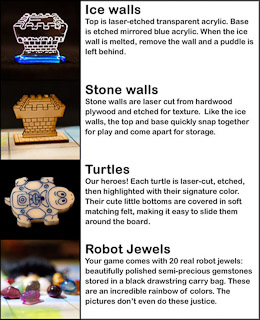 There's also a really cool version available that makes this game even more limited than the 10 or 15 thousand that will be produced: At the $200 pledge level, Dan is providing tiles and turtles laser cut from acrylic and wood as well as semi-precious stones serving as the jewels in the game. Unfortunately, due to the intricate nature of these pieces (the ice wall detaches from its base leaving an acrylic blue puddle), it's not good for playing with kids under 13, but he is including the standard pieces as well so it can be played with both the super nice three-dimensional pieces and the cardboard pieces suitable for play with younger children. He's only making 40 of these for the folks who pledge at this level and at the time of publication of this article there are still four remaining.
There's also a really cool version available that makes this game even more limited than the 10 or 15 thousand that will be produced: At the $200 pledge level, Dan is providing tiles and turtles laser cut from acrylic and wood as well as semi-precious stones serving as the jewels in the game. Unfortunately, due to the intricate nature of these pieces (the ice wall detaches from its base leaving an acrylic blue puddle), it's not good for playing with kids under 13, but he is including the standard pieces as well so it can be played with both the super nice three-dimensional pieces and the cardboard pieces suitable for play with younger children. He's only making 40 of these for the folks who pledge at this level and at the time of publication of this article there are still four remaining.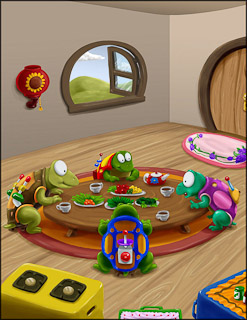 I think the most compelling level to pledge at is the $60 level where you get to add the name of your child into the manual, receive a "personalize" thank you letter from one of the turtles to your child, and a beautifully illustrated pick-your-own-path e-book that you can read with your child. Here's one of the illustrations that Dan posted recently.
I think the most compelling level to pledge at is the $60 level where you get to add the name of your child into the manual, receive a "personalize" thank you letter from one of the turtles to your child, and a beautifully illustrated pick-your-own-path e-book that you can read with your child. Here's one of the illustrations that Dan posted recently.You can get the game by pledging as little as $29 (which is incredible for a limited-run game made completely in the United States - it will be printed by Delano Services in Battle Creek, Michigan).
Hopefully, you're as excited about Robot Turtles as I am, and you'll check out their Kickstarter page:
Robot Turtles: The Board Game for Little Programmers
Related Articles
